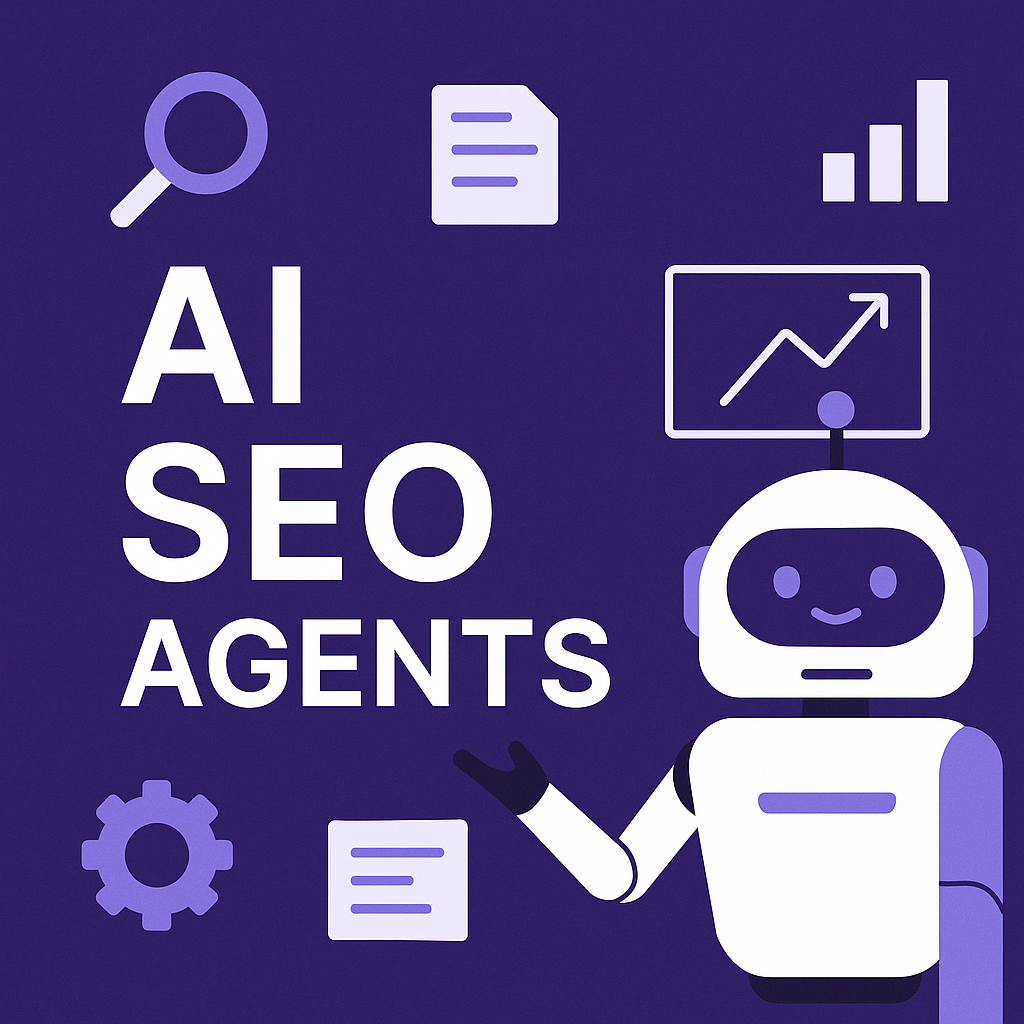What are AI SEO Agents? Features, Benefits, and Best Practices
If you’re running SEO for a business or SaaS product, you already know the grind: constant algorithm changes, shifting search intent, technical audits, UX signals, and the never-ending pressure to publish high-quality content.
Most teams end up patching together five or six tools to keep up and then spend hours wrestling with spreadsheets to make sense of it all. It’s exhausting.
And that’s exactly what AI SEO agents are built to solve.
In this post, we’ll break down what AI SEO agents are, how they’re transforming modern SEO workflows, and how they can help you streamline your strategy, boost performance, and finally take some of the chaos out of SEO.
What are AI SEO Agents?
AI SEO agents are AI-powered assistants designed to automate and manage multiple SEO tasks with minimal human intervention.
Think of them as your smartest, most tireless SEO team members who never sleep.
They can analyze your blog to find posts that need urgent updates, recommend internal links based on smart keyword clusters, and instantly alert you when one of your key pages drops in rankings, all without you lifting a finger.
In fact, 75% of marketers already use AI to cut down time spent on tedious tasks like keyword research and meta-tag optimization—exactly the kind of work these SEO agents can automate in seconds.
How do AI SEO Agents Work?
The big question is, if these SEO agents are so impactful, how exactly do they work?
Well, these agents combine several advanced technologies:
- Natural Language Processing (NLP): helps them understand search intent and content meaning beyond simple keywords. This means they know why people are searching, not just what they’re typing.
- Machine Learning (ML): helps them learn from data trends and past results, improving recommendations, prioritizing tasks, and even predicting ranking shifts before they occur.
- Real-time data integration: ensures they’re always working with fresh information from your site analytics, Google Search Console, Trends, Keyword Planner, and rank trackers.
- Automation engines: power the behind-the-scenes workflows. This helps these agents auto-generate content briefs, suggest internal links, scan for technical issues, and more.
With these combined technologies, it’s no wonder that 86% of SEO professionals have already integrated AI into their strategy. Even better, 65% of them have reported improved results since doing so.
If you want similar outcomes, now’s the perfect time to follow their lead.
How are AI SEO Agents Different from Traditional SEO Tools and AI Chatbots?
To understand the value of these AI agents, it’s important to see how they differ from both traditional SEO tools and AI chatbots like ChatGPT.
AI SEO Agents Vs. Traditional SEO tools
Traditional SEO tools are powerful, but they all share the same limitation: they give you data, not decisions.
You get keyword volumes, backlink stats, and technical audit results, but it’s up to you to make sense of it all.
You’re the one sifting through dashboards, exporting reports, digging for keyword gaps, tracking backlinks, and flagging technical issues.
But SEO agents flip that script entirely.
Let’s say your rankings suddenly drop.
A traditional SEO tool might alert you to the decline and point out that your page speed is below optimal. That’s helpful, but the real work is still on you.
An AI agent like NightOwl, on the other hand, will generate a ready-to-implement action plan tailored to your team.
![]()
It will provide you with a detailed analysis and a technical solution for your developers, content adjustments for your writers, and even internal linking optimizations.
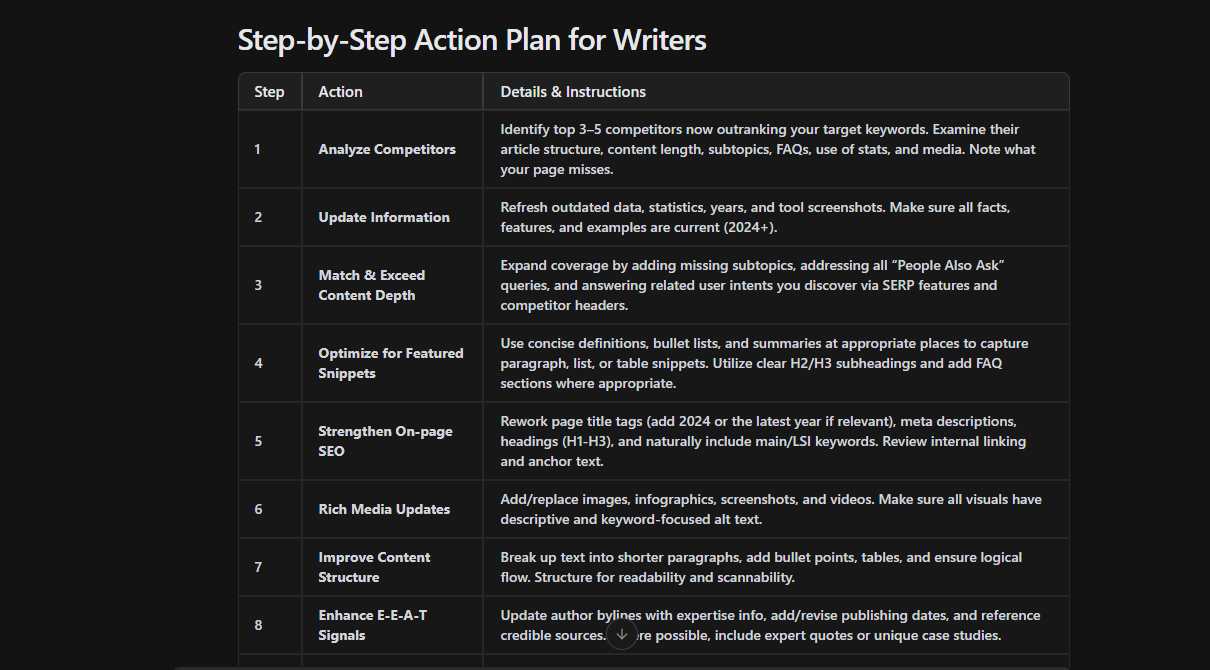
It’s the difference between using a map and having a co-pilot who navigates and drives.
One gives you direction. The other gets you there faster.
AI SEO Agents Vs. AI Chatbots
AI chatbots, like ChatGPT, are conversational interfaces powered by large language models that can answer questions, generate content, and even assist with SEO research.
But while they excel in natural language interaction, AI SEO agents combine that conversational ability with deep integration of SEO data, automation, and real-time monitoring.
You could ask ChatGPT,
“Conduct keyword research for the search term ‘project management,’”
You’ll get a list of common search terms, but they’re usually surface-level, and not drawn from real-time SERP data.
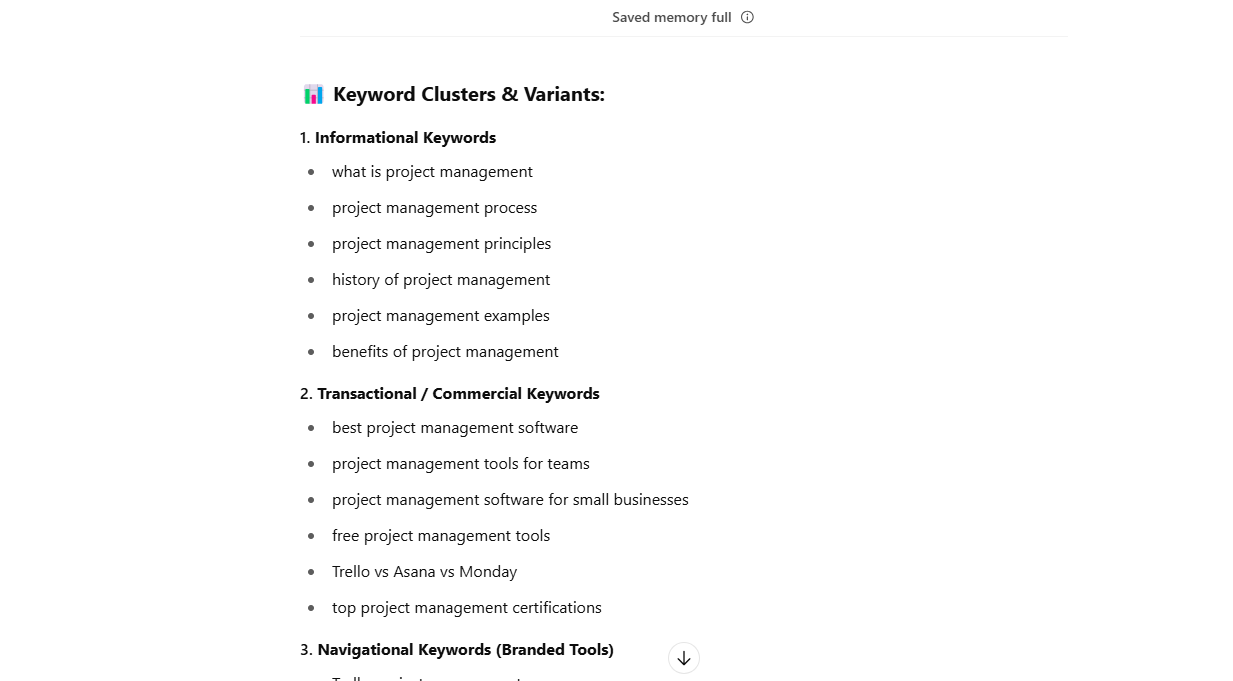
You still have to cross-check them in SEO tools, look at search volume, assess competition, and decide which keywords are actually worth targeting.
But when I feed the same prompt into an AI SEO agent like NightOwl, I get more detailed, reliable SEO data I can work with:
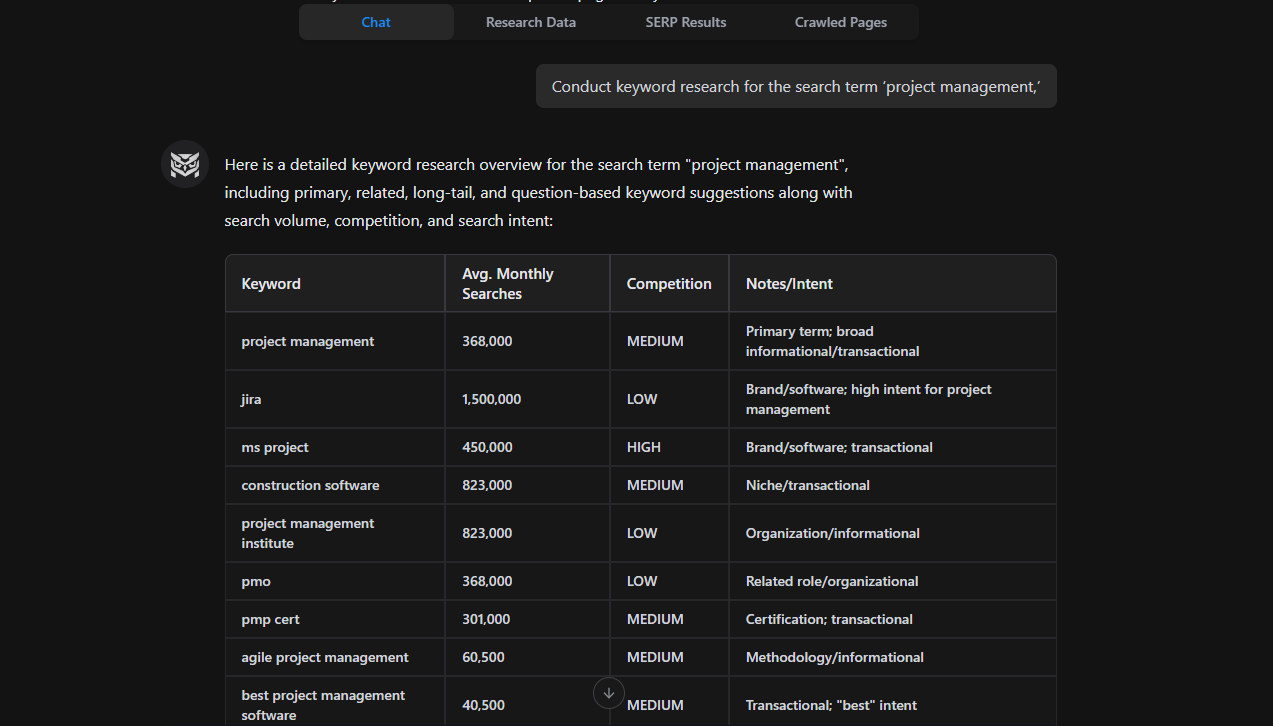
Here’s a detailed breakdown of the differences between these three tools:
| Feature / Capability | AI SEO Agents (e.g. NightOwl) | Traditional SEO Tools | AI Chatbots (e.g. ChatGPT) |
|---|---|---|---|
| Data Access | Uses real-time SEO data + SERP insights | Relies on indexed data, may lag in freshness | No direct access to SEO tools or live SERP data |
| Task Automation | Automates full workflows (audits, keyword planning, link updates) | Manual; user pulls and interprets reports | Limited to generating suggestions or content |
| Decision-Making Support | Offers actionable, tailored recommendations | Provides raw data only. Decisions left to user | Lacks SEO-specific context or action plans |
| Technical SEO Capabilities | Runs diagnostics + gives dev-ready fixes | Identifies issues; you still analyze and implement | Cannot run or interpret technical audits |
| Keyword Research | Suggests real-time, prioritized keyword clusters | Surfaces keyword lists, but needs manual validation | Generates keyword ideas, no SERP validation |
| Content Strategy | Recommends internal links, flags content gaps | Requires manual mapping and linking | Can suggest content but not link or gap insights |
| User Experience | Feels like a strategic teammate. Conversational + data-driven | Tool-centric dashboards with steep learning curves | Conversational and easy, but lacks deep integration |
To get the most from AI SEO agents, equip your team with foundational AI skills. A practical generative AI introduction covering LLM basics, prompt engineering, agent frameworks, and RAG will help marketers craft better prompts, interpret model outputs, and collaborate with developers on automations. Look for courses that include hands-on projects, ethical guidelines, and business use cases for SEO, so the learning translates directly into faster briefs, smarter clustering, and safer deployment.
Key Features of AI SEO Agents
We’ve been talking about how powerful AI SEO agents are and how they can take the guesswork (and grunt work) out of SEO.
But what kind of grunt work can you expect them to take off your hands?
Let’s take a quick look into some of the key features that make these tools indispensable in your SEO strategy.
Keyword Opportunity Discovery
Suppose I’m managing content marketing for an email marketing software company.
I could prompt NightOwl like this:
“Using the seed keyword ‘email marketing software,’ generate comprehensive keyword clusters based on search intent, competition level, and user behavior. Group related keywords into thematic clusters, such as features, integrations, pricing, and user guides. Provide content topic suggestions for each cluster to strengthen topical authority and improve ranking potential.”
In seconds, I’m given a rich, data-driven list of keywords, complete with search volume, competition, CPC, and even bid range.
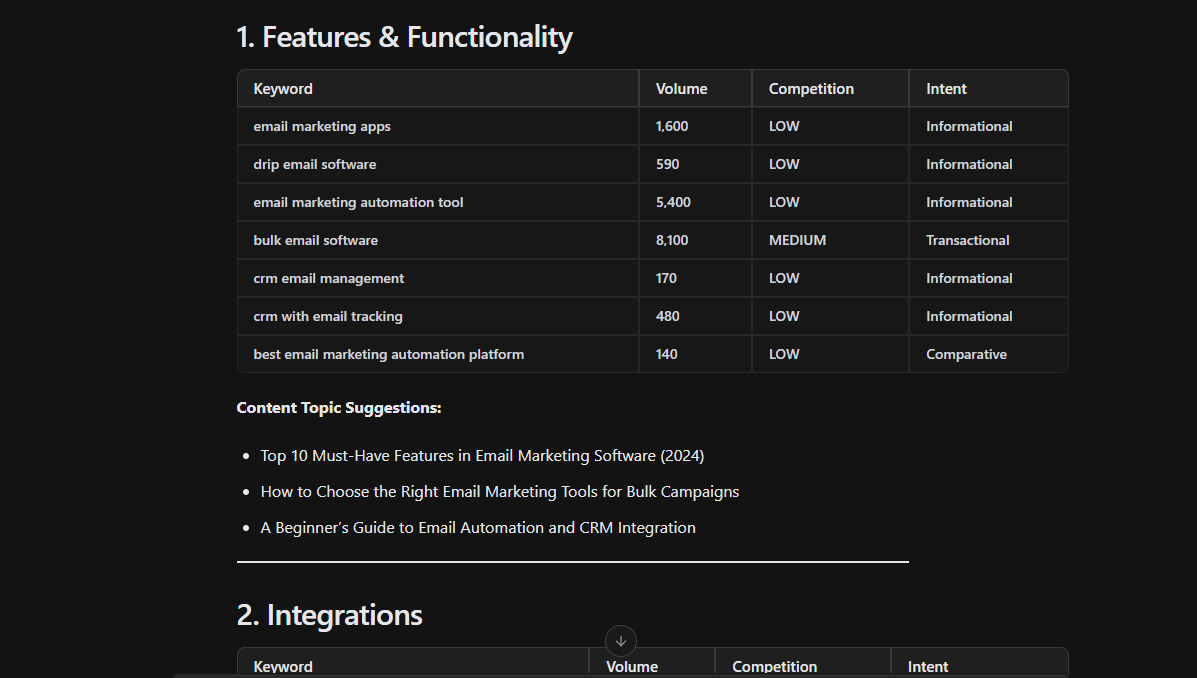
But NightOwl doesn’t stop there. It goes further by automatically clustering related keywords into meaningful groups based on semantic relationships and searcher intent.
Each cluster is also ranked by potential impact, so I know which ones to tackle first.
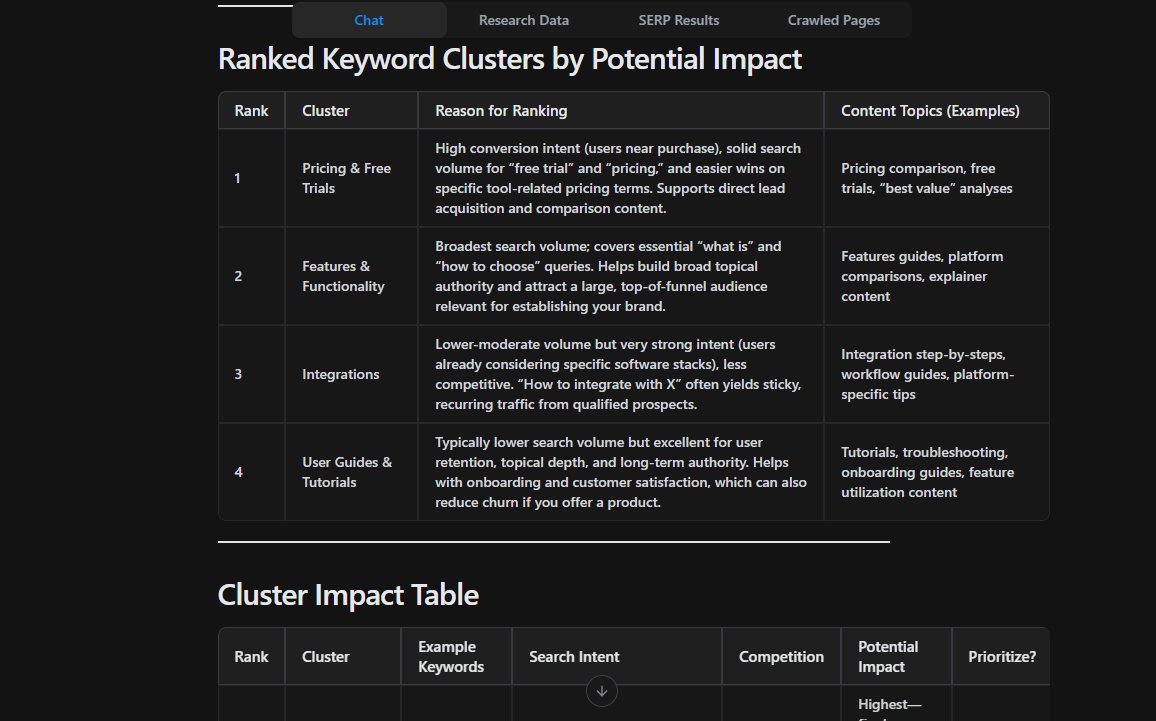
SERP Pattern Recognition and Clustering
Aside from keyword research, AI SEO agents can also analyze real-time search engine results pages (SERPs) to understand what ranks and why.
For instance, in NightOwl, you might run a prompt like:
“Analyze the SERPs for the keyword ‘email marketing automation tools.’ Break down the top 10 results by content format, search intent, and SERP features like featured snippets or FAQs. Based on this, suggest keyword clusters, subtopics, and the optimal content structure to rank. Include recommendations on format (e.g., comparison table, how-to guide, FAQ).”
Instead of a simple keyword list, the AI agent responds with a detailed breakdown of the SERP.
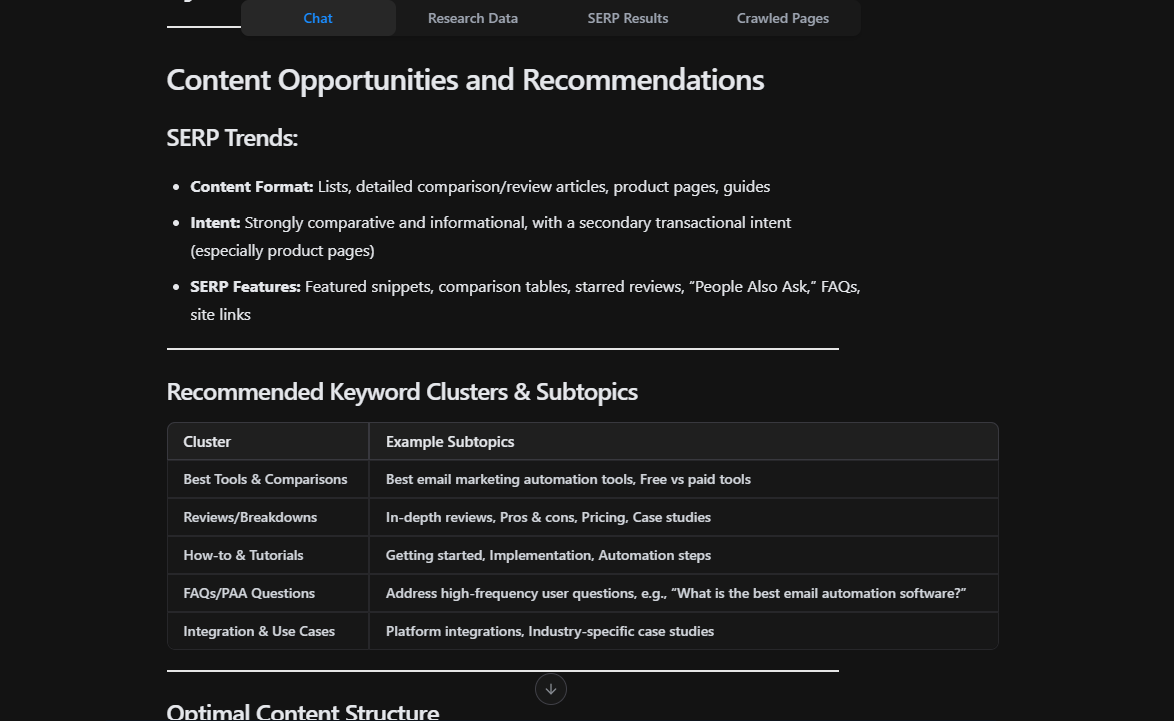
It might reveal that the top results are mostly comparison listicles, product pages, all targeting commercial intent.
It could also point out that structured data and internal links to pricing or demo pages are common across top performers.
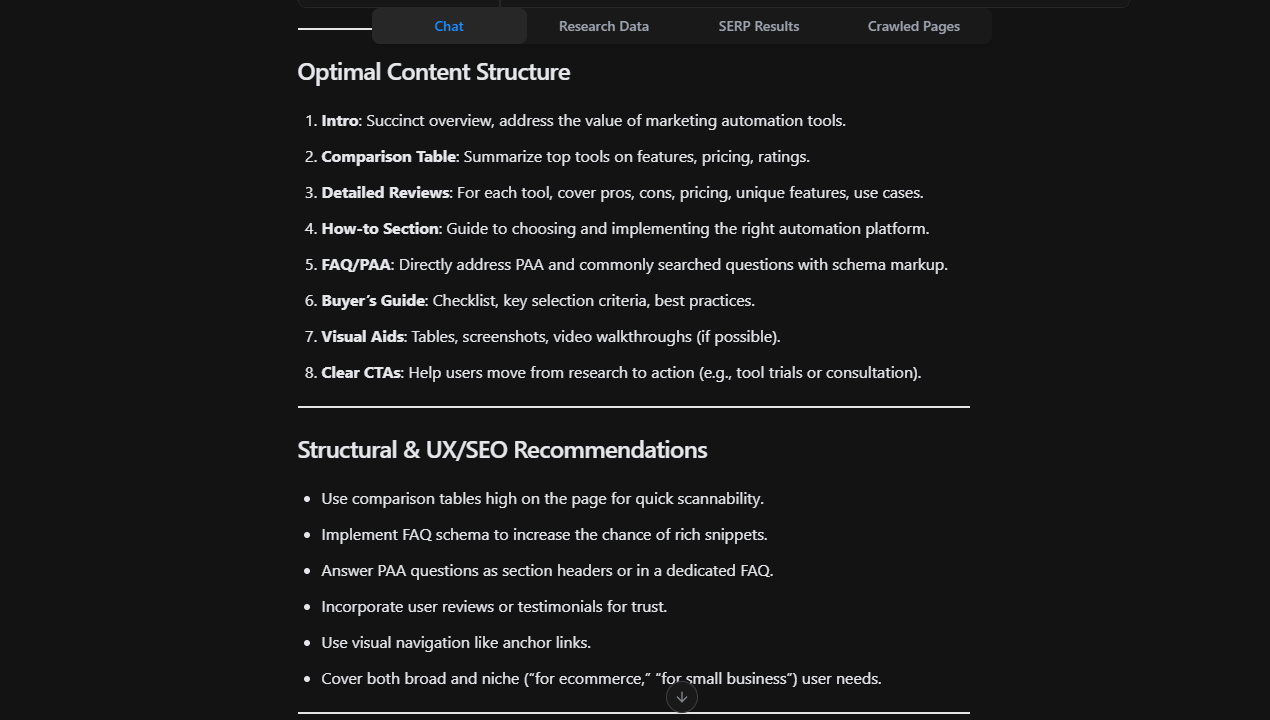
With that information, you now know how to create a comparison guide that includes a side-by-side feature table, a detailed FAQ, and schema markup. Because that’s the type of content Google is already rewarding.
AI-Powered Content Briefs and Optimization
Creating well-optimized content starts with a strong foundation, and AI SEO agents make that effortless by generating intelligent, data-backed content briefs.
All you need is a prompt like this:
“Generate a content brief for the keyword ‘email marketing automation.’ Include keyword clusters, headings, People Also Ask (PAA) questions, and suggested internal links from my blog. Highlight any content gaps or missing subtopics based on current SERP trends.”
In response, NightOwl could produce a rich brief with the target keyword, keyword clusters, and main outline:
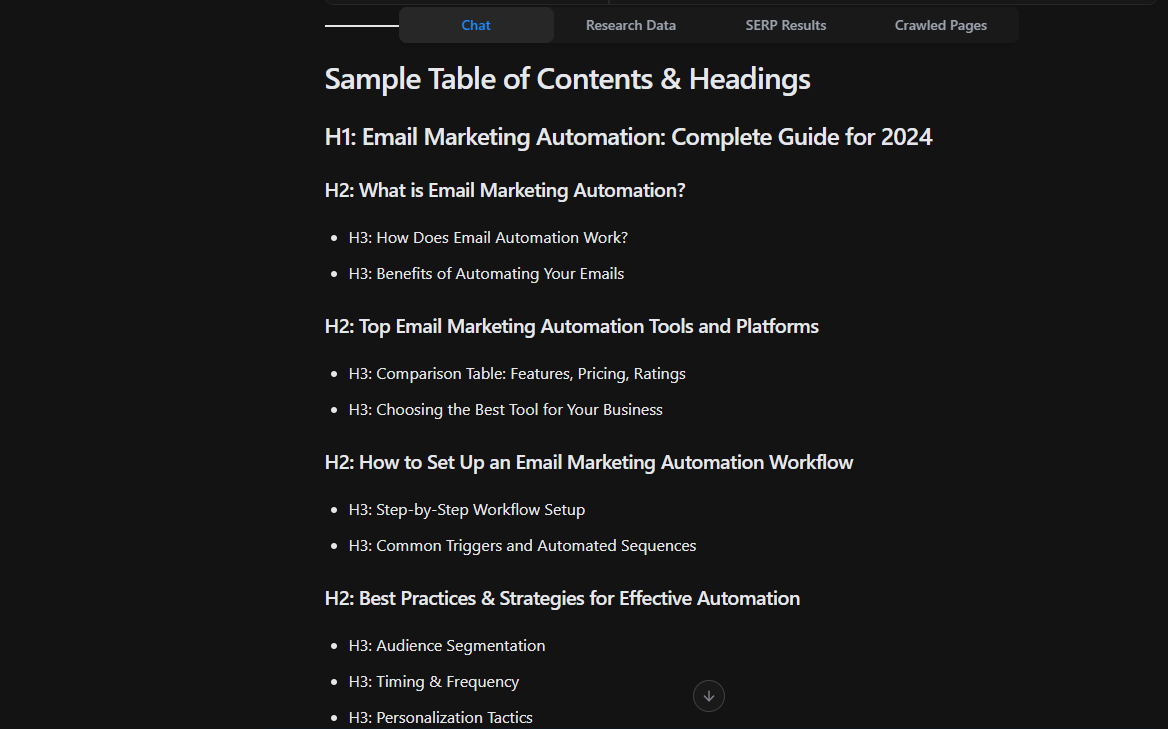
It might also pull “People Also Ask” queries from the SERPs, such as:
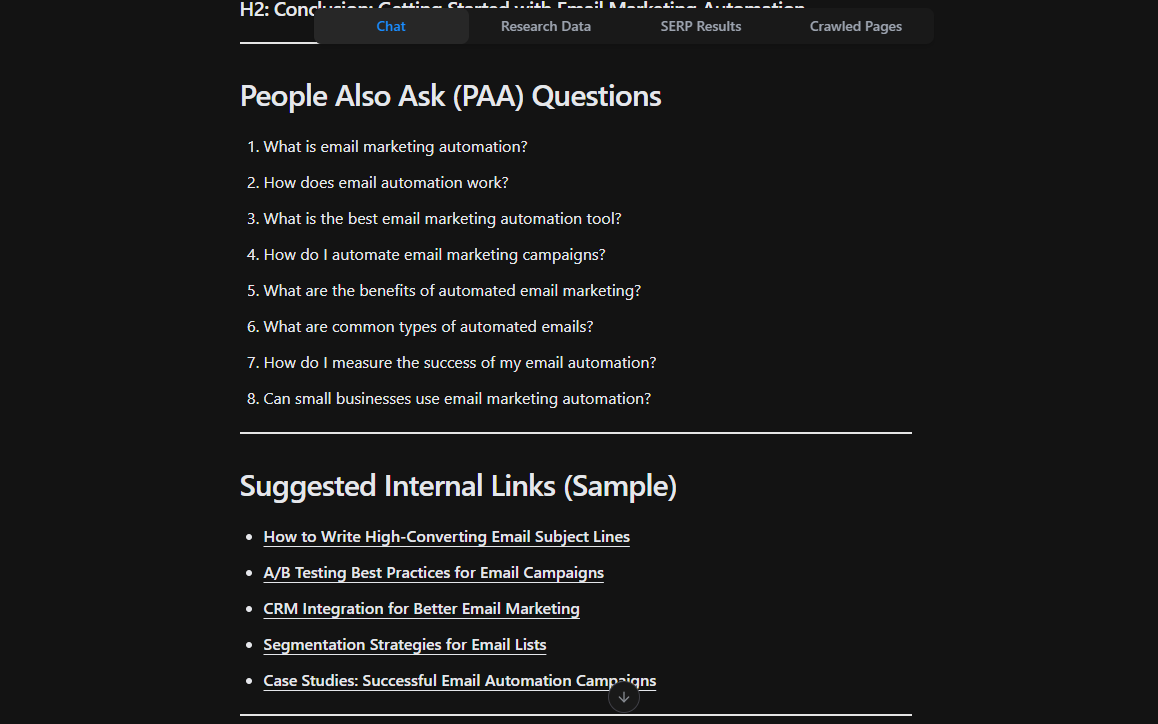
These help structure your article and guide your topic coverage to match user search intent.
AI SEO agents can also help you optimize existing content.
Suppose a piece on “best email marketing tools” is dropping in traffic. In that case, the agent might suggest adding new tools, updating outdated screenshots, incorporating fresh statistics, or including related search queries.
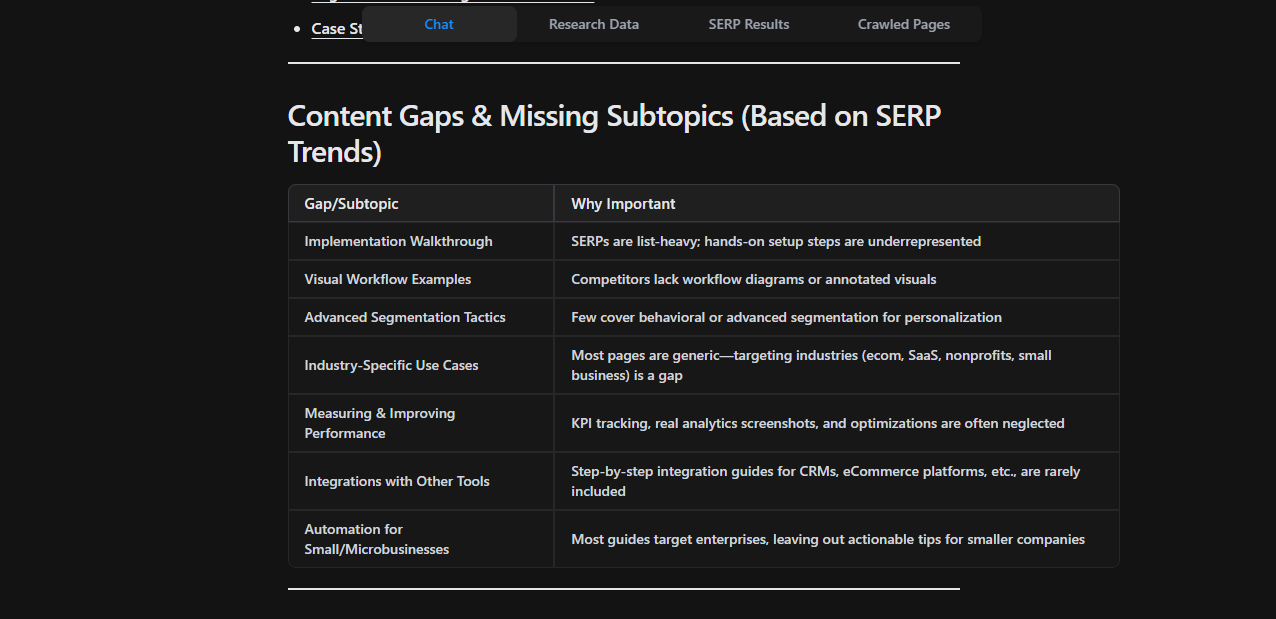
It can even highlight missed opportunities by pulling “People Also Search For” queries to identify adjacent topics worth weaving in.
Technical SEO Automation
Traditionally, technical SEO audits involve running separate reports, combing through spreadsheets, and manually checking your site’s structure.
But with AI SEO agents like NightOwl, you can automate these audits and instantly surface actionable insights. That’s why 67% of SEO experts say automated site auditing is one of the top benefits of using AI for SEO.
For example, if you try a prompt like:
“Audit my website’s blog section for technical SEO issues. Highlight missing H1/H2 tags, unoptimized images, broken internal links, and slow-loading pages. Prioritize issues by impact and recommend quick fixes for each.”
Within seconds, NightOwl will return a clear, categorized report such as:
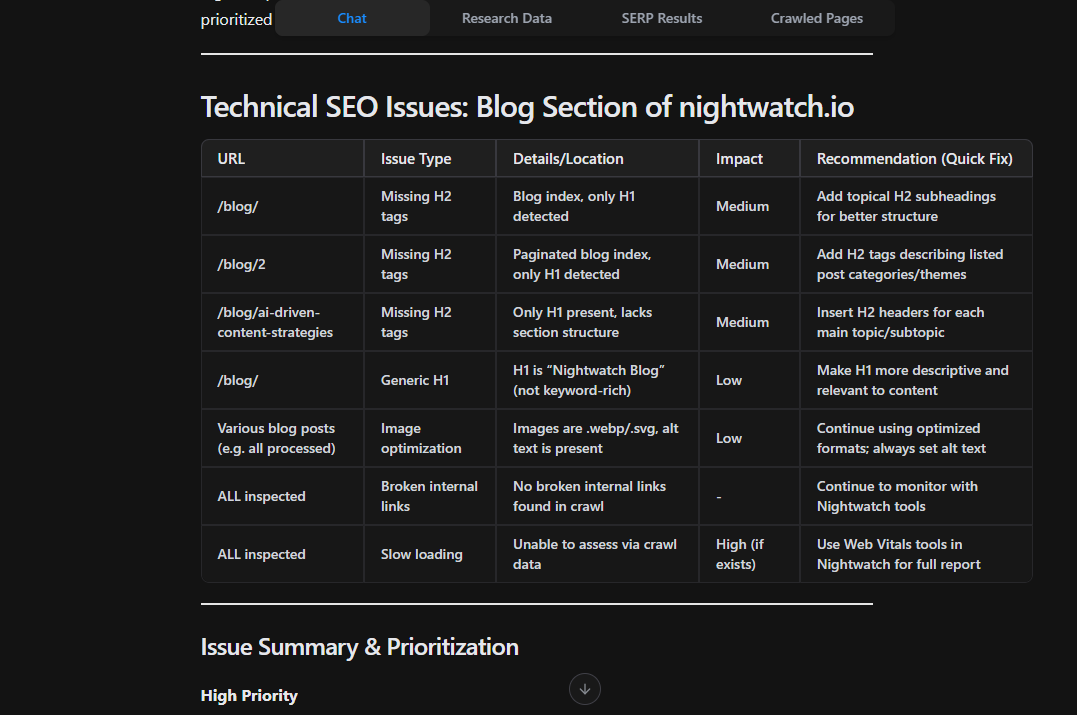
You could even get more granular by prompting:
“Scan the homepage and landing pages for mobile usability issues, schema markup errors, and duplicate meta descriptions. Recommend optimizations in priority order.”
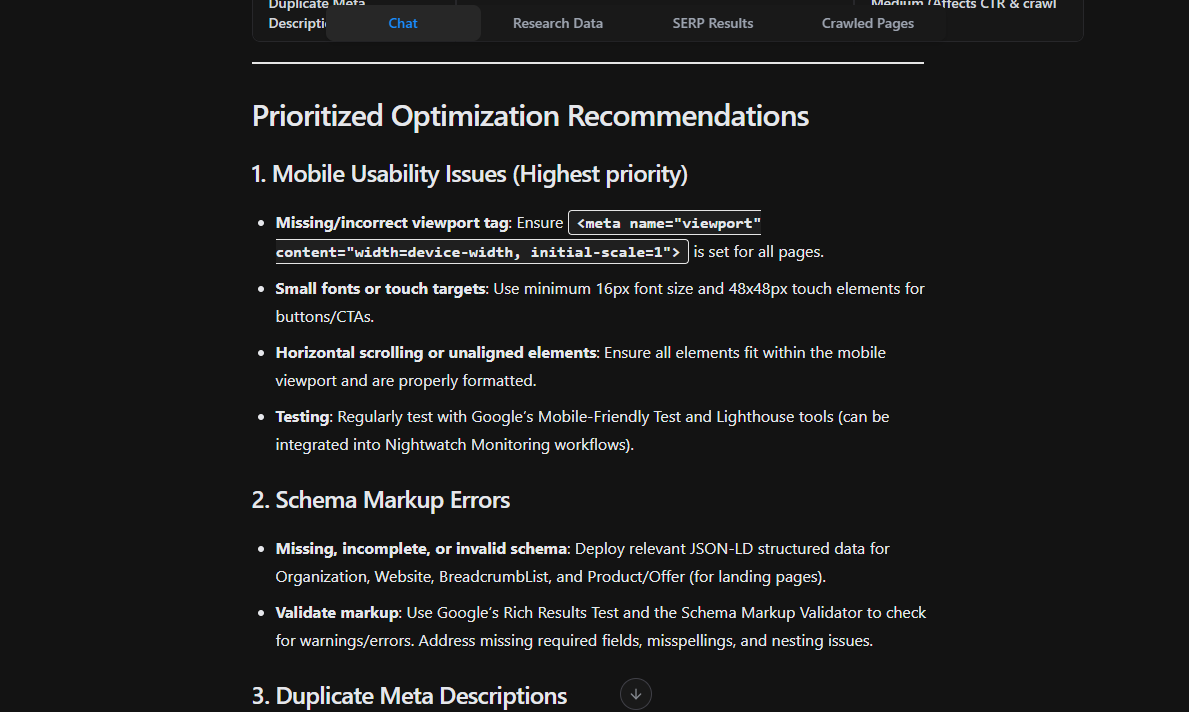
This hands-free auditing saves hours of manual effort while giving you clear, prioritized action items tailored to your site’s structure and goals.
Internal Linking and Content Gap Detection
Say you’ve just published a blog post titled “Top SEO Tools.”
Rather than manually searching your site for related pages to link to, you can prompt NightOwl:
“Find 5 to 10 high-authority internal pages on my website that are semantically related to ‘top SEO tools’ and recommend anchor text for contextual internal linking.”
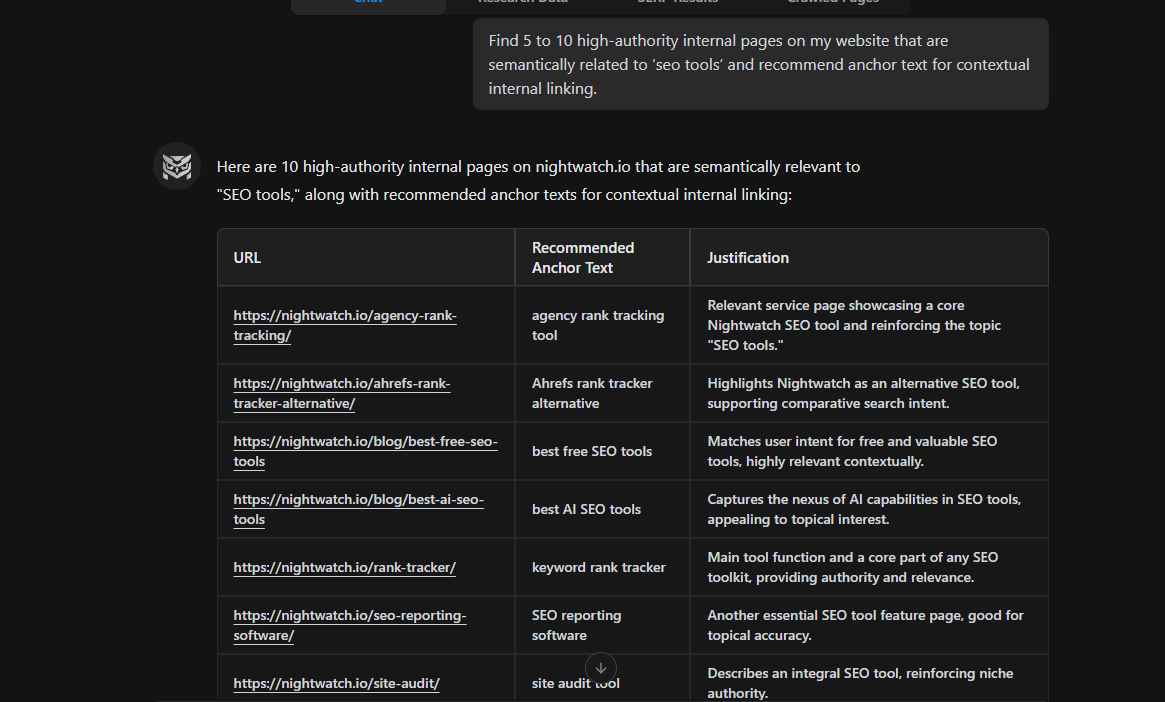
But internal linking is just one side of the coin. AI SEO agents also detect content gaps—critical topics you’re missing that competitors or top-ranking pages already cover.
For instance, if your blog covers topics like “email marketing tools,” “newsletter design,” and “automated campaigns” but skips over “email deliverability best practices” or “email warm-up tools,” NightOwl will flag these as missing topics.
Here’s a sample prompt to detect gaps:
“Compare my current content on email marketing with the top 10 ranking domains. Identify high-search, low-competition subtopics I haven’t covered yet.”
From there, NightOwl can even help you brainstorm new content ideas to fill those gaps and internally link them to your existing topic clusters, boosting both topical authority and user experience.
Five Benefits of Using AI SEO Agents
Here are five benefits you stand to gain from adopting AI SEO agents in your strategy.
Productivity Boost
Imagine waking up to a full SEO report that used to take you hours to compile overnight.
Nice, right?
NightOwl can instantly:
“Cluster these 500 keywords based on search intent and suggest content formats for each.”
Or
“Scan my site for missing H1 tags, uncompressed images, and broken internal links.”
And remember your time-consuming content gap analysis? That’s covered, too:
“Compare my content on ‘CRM tools’ with top-ranking competitors and flag missing angles.”
This means you get your time back to focus on big-picture strategy. That could be more time invested in actually planning your next content campaign or finally pitching that creative campaign you’ve been sitting on.
Cost Savings
Usually, you’d need three to five different SEO tools to cover everything NightOwl does, like keyword research, technical audits, rank tracking, content optimization, and SERP analysis.
Each of those tools has its learning curve and price tag.
And if you’re outsourcing to an agency or consultant? Even pricier.
With NightOwl, you can prompt:
“Scan my top 50 blog posts and suggest updates to improve rankings and internal linking.”
And instantly, you’ve replaced hours of expert work in one click.
You don’t need to pay for separate keyword tools, auditing platforms, or optimization software.
SEO agents like Nightwatch consolidate it all, saving you serious money while improving your ROI.
Smarter Decisions
No matter how experienced you are, it’s easy to miss golden SEO opportunities, especially when you’re working off gut feelings or scattered spreadsheets.
So, let AI SEO agents be your second pair of eyes.
You can ask NightOwl to:
“Compare my blog on ‘CRM tools for small businesses’ with the top 5 ranking pages. What’s missing?”
And it might come back with insights like:
- You’re missing FAQs related to integrations.
- Competitors use comparison tables that you don’t.
- Your meta description is too short to match user intent.
Even better, AI SEO agents can speed up data analysis by up to 50%, helping you make faster, smarter decisions without drowning in spreadsheets.
Scalability
Doing SEO for a 10-page website? You can get by manually.
But when you’re managing 300 blog posts and 100 landing pages, it’s a different story.
NightOwl scales effortlessly. You can run site-wide audits with a single prompt like:
“Identify all pages missing H1 tags, alt text on images, or internal links to my ‘Pricing’ page.”
Within seconds, NightOwl will return a clean, prioritized list of issues, complete with explanations and actionable suggestions.
Let’s say you’re refreshing 150 blog posts. Before you think of opening each one and manually auditing for on-page SEO flaws, just prompt NightOwl:
“Audit all blog posts published before 2023 for missing meta titles, outdated keywords, and opportunities to add internal links.”
And voilà! You get a master to-do list tailored for your content or dev team, so nothing slips through the cracks.
Competitive Edge
AI agents can help you understand the “why” behind every move. With the right prompt, they can compare your content against top-ranking pages and identify what has changed.
For example, you might ask:
“Why did my article on ‘email automation tips’ drop from position #3 to #7 this month?”
NightOwl analyzes SERP trends, competitor content, and page performance to provide actionable insights. It might come back with insights like:
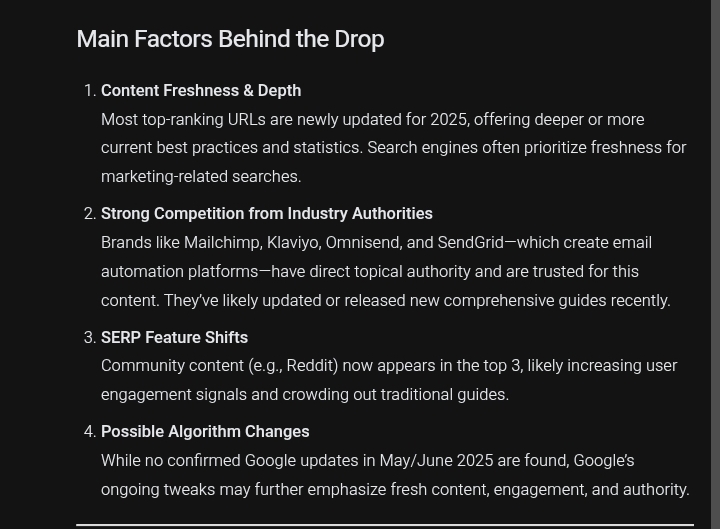
And the best part? It also offers real solutions as well:
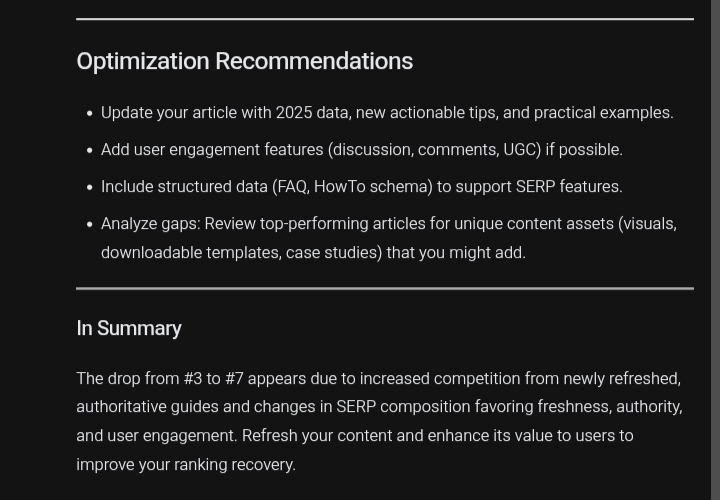
Common Challenges of Using SEO Agents and How to Navigate Them
AI SEO agents can make you feel like you’ve got an SEO superpower, but like any powerful tool, they work best when you understand their strengths and their limits.
Here’s a closer look at some common pitfalls and how to navigate them smartly:
AI Doesn’t Equal Strategy
AI agents can analyze thousands of SERP results in seconds, identify trending keywords, and tell you what Google currently favors.
But strategy? That’s still a human job.
They might highlight that your top competitor’s post includes FAQs and comparison charts, but deciding how your brand enters the conversation, what tone to use, and which angle resonates with your audience is crucial.
That’s on you.
So, treat AI outputs as a strategic foundation, not a final draft. Then, add your brand’s flavor, values, and perspective.
Over-Reliance on AI
Maybe your AI agent recommends inserting a keyword 15 times in a 1,000-word article, but if it sounds robotic or ruins the flow, it’ll push readers away and possibly trigger Google’s spam radar.
The smart move is to use AI like an editorial assistant.
Let it handle the data-crunching and bring in your judgment to finesse tone, structure, and flow.
Learning Curve
Harnessing the power of agents lies in prompts, but knowing what to ask and how to interpret the answers isn’t always intuitive.
For example, NightOwl can:
- Audit your entire site for missing alt text, H1 tags, or slow-loading images.
- Identify clusters of related keywords to build out pillar pages.
- Suggest content updates to recapture lost rankings.
But these results come from thoughtful prompts like:
“Audit my top 100 blog posts for SEO issues and prioritize them based on organic traffic drop.”
And not “audit my blog.”
So what’s the solution?
You can prompt your AI tool to craft effective prompts for each task and then organize those prompts in a library for your team to reuse.
I tried that with NightOwl, and here’s a prompt it suggested for getting better keyword research results:
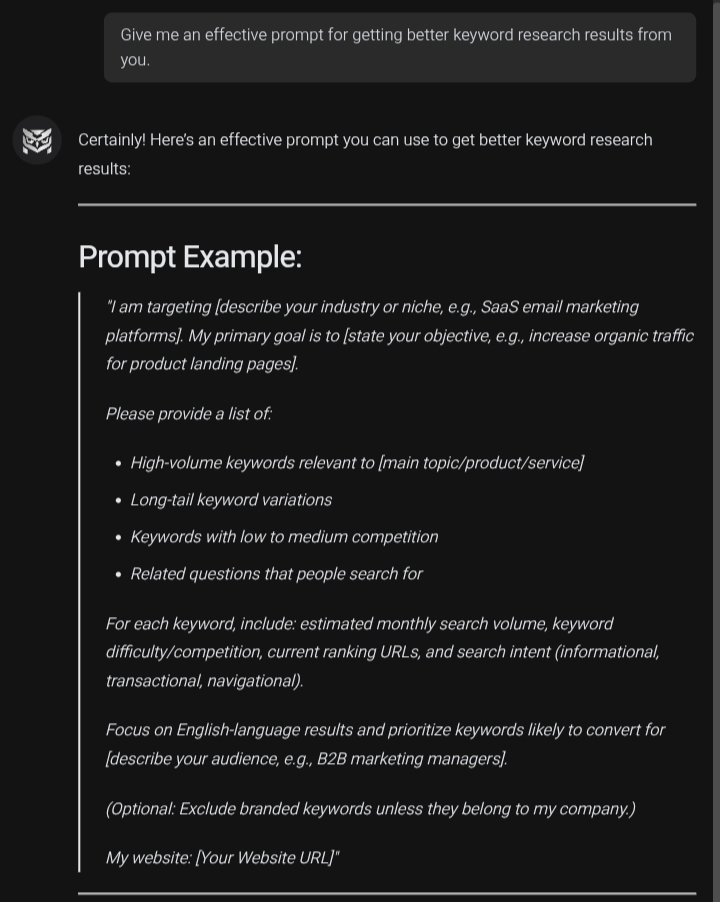
Frequently Asked Questions
What’s the difference between an AI SEO agent and traditional SEO tools?
Traditional SEO tools provide you with data, but you still have to interpret and act on it. AI SEO agents like NightOwl analyze that data for you and generate clear, actionable recommendations tailored to your site’s goals, saving time and reducing manual guesswork.
Can AI SEO agents completely replace human SEO strategists?
Not quite. While they’re powerful for automation and analysis, AI agents still need human oversight for brand voice, storytelling, and high-level strategy.
Are AI SEO agents suitable for small websites or teams?
Absolutely. Even if you’re running a small site, an AI SEO agent can help you punch above your weight by streamlining research, detecting gaps, and maintaining technical health without the cost of a large SEO team or multiple tools.
Let AI SEO Agents Do the Heavy Lifting
If you’re still relying solely on spreadsheets, scattered tools, or outdated workflows, you’re already behind.
SEO has evolved, and so should your approach.
AI SEO agents like NightOwl aren’t just nice-to-haves anymore; they’re what separates good strategies from great ones.
Yes, human insight still matters. You need the vision, voice, and strategy to lead. But the smartest marketers today are combining that strategy with the speed, scale, and precision that only AI can offer.
So here’s the tip: stop doing everything the hard way. Use AI to handle the heavy lifting so that you can focus on big-picture thinking, sharper content, and faster execution.
Ready to leave outdated methods behind?
Sign up for NightOwl and upgrade your SEO with an AI agent that works around the clock, so you don’t have to.
